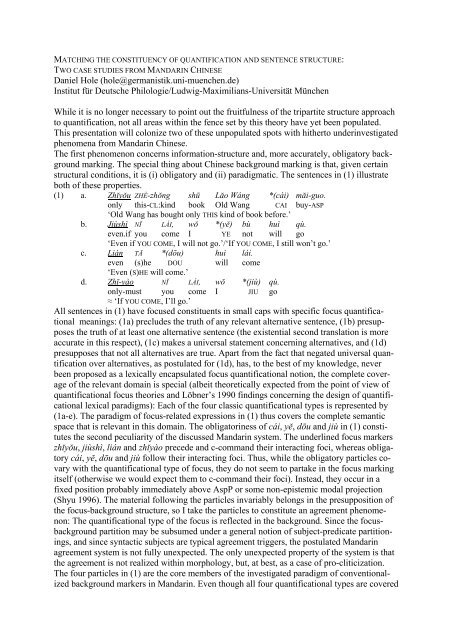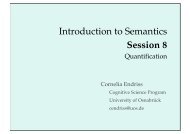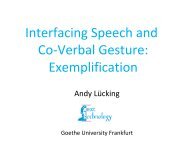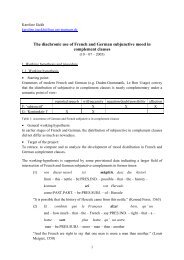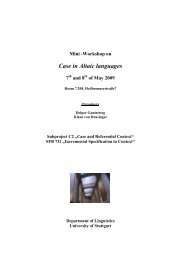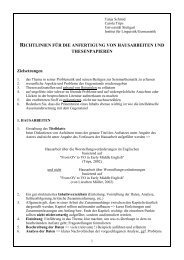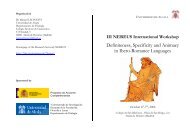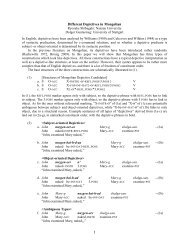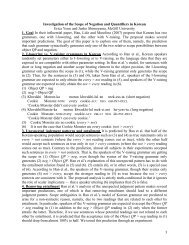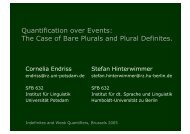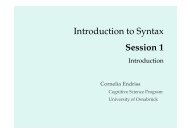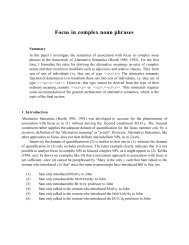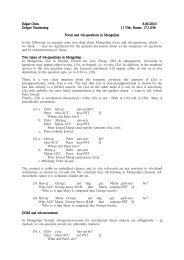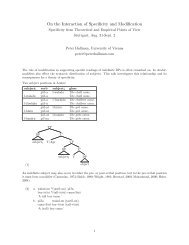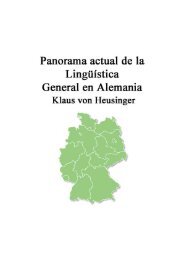SemPrag03.Progr.pdf - Institut für Linguistik/Germanistik - Universität ...
SemPrag03.Progr.pdf - Institut für Linguistik/Germanistik - Universität ...
SemPrag03.Progr.pdf - Institut für Linguistik/Germanistik - Universität ...
Create successful ePaper yourself
Turn your PDF publications into a flip-book with our unique Google optimized e-Paper software.
MATCHING THE CONSTITUENCY OF QUANTIFICATION AND SENTENCE STRUCTURE:<br />
TWO CASE STUDIES FROM MANDARIN CHINESE<br />
Daniel Hole (hole@germanistik.uni-muenchen.de)<br />
<strong>Institut</strong> <strong>für</strong> Deutsche Philologie/Ludwig-Maximilians-<strong>Universität</strong> München<br />
While it is no longer necessary to point out the fruitfulness of the tripartite structure approach<br />
to quantification, not all areas within the fence set by this theory have yet been populated.<br />
This presentation will colonize two of these unpopulated spots with hitherto underinvestigated<br />
phenomena from Mandarin Chinese.<br />
The first phenomenon concerns information-structure and, more accurately, obligatory background<br />
marking. The special thing about Chinese background marking is that, given certain<br />
structural conditions, it is (i) obligatory and (ii) paradigmatic. The sentences in (1) illustrate<br />
both of these properties.<br />
(1) a. Zhĭyŏu ZHÈ-zhŏng shū Lăo Wáng *(cái) măi-guo.<br />
only this-CL:kind book Old Wang CAI buy-ASP<br />
‘Old Wang has bought only THIS kind of book before.’<br />
b. Jiùshì NĬ LÁI, wŏ *(yĕ) bù huì qù.<br />
even.if you come I YE not will go<br />
‘Even if YOU COME, I will not go.’/‘If YOU COME, I still won’t go.’<br />
c. Lián TĀ *(dōu) huì lái.<br />
even (s)he DOU will come<br />
‘Even (S)HE will come.’<br />
d. Zhĭ-yào NĬ LÁI, wŏ *(jiù) qù.<br />
only-must you come I JIU go<br />
≈ ‘If YOU COME, I’ll go.’<br />
All sentences in (1) have focused constituents in small caps with specific focus quantificational<br />
meanings: (1a) precludes the truth of any relevant alternative sentence, (1b) presupposes<br />
the truth of at least one alternative sentence (the existential second translation is more<br />
accurate in this respect), (1c) makes a universal statement concerning alternatives, and (1d)<br />
presupposes that not all alternatives are true. Apart from the fact that negated universal quantification<br />
over alternatives, as postulated for (1d), has, to the best of my knowledge, never<br />
been proposed as a lexically encapsulated focus quantificational notion, the complete coverage<br />
of the relevant domain is special (albeit theoretically expected from the point of view of<br />
quantificational focus theories and Löbner’s 1990 findings concerning the design of quantificational<br />
lexical paradigms): Each of the four classic quantificational types is represented by<br />
(1a-e). The paradigm of focus-related expressions in (1) thus covers the complete semantic<br />
space that is relevant in this domain. The obligatoriness of cái, yĕ, dōu and jiù in (1) constitutes<br />
the second peculiarity of the discussed Mandarin system. The underlined focus markers<br />
zhĭyŏu, jiùshì, lián and zhĭyào precede and c-command their interacting foci, whereas obligatory<br />
cái, yĕ, dōu and jiù follow their interacting foci. Thus, while the obligatory particles covary<br />
with the quantificational type of focus, they do not seem to partake in the focus marking<br />
itself (otherwise we would expect them to c-command their foci). Instead, they occur in a<br />
fixed position probably immediately above AspP or some non-epistemic modal projection<br />
(Shyu 1996). The material following the particles invariably belongs in the presupposition of<br />
the focus-background structure, so I take the particles to constitute an agreement phenomenon:<br />
The quantificational type of the focus is reflected in the background. Since the focusbackground<br />
partition may be subsumed under a general notion of subject-predicate partitionings,<br />
and since syntactic subjects are typical agreement triggers, the postulated Mandarin<br />
agreement system is not fully unexpected. The only unexpected property of the system is that<br />
the agreement is not realized within morphology, but, at best, as a case of pro-cliticization.<br />
The four particles in (1) are the core members of the investigated paradigm of conventionalized<br />
background markers in Mandarin. Even though all four quantificational types are covered


